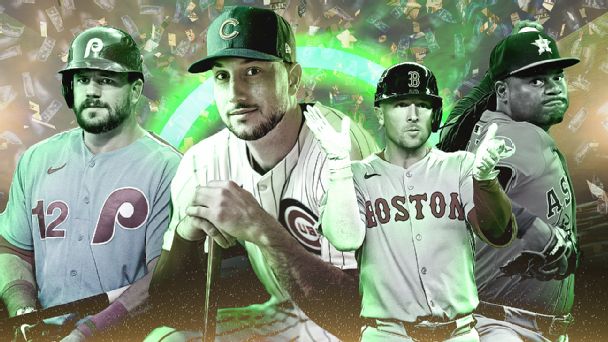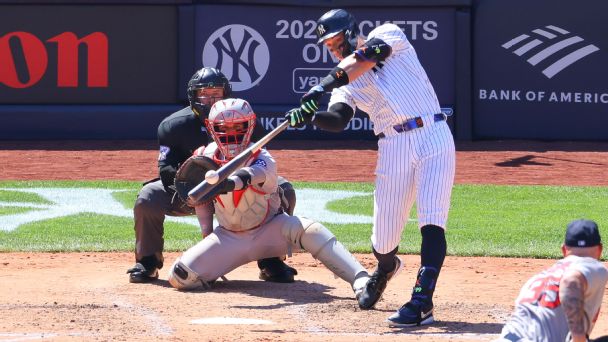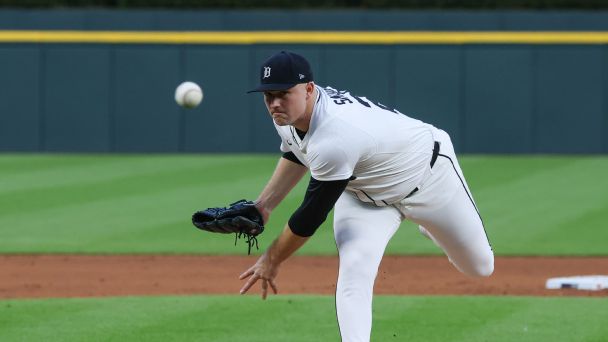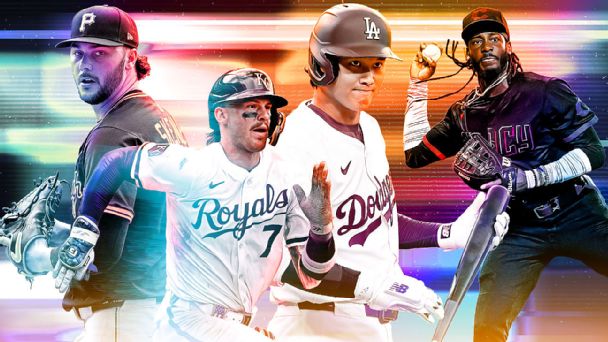The hot stove season is already burning, but even amid the jostling of 2026 rosters, we have one last bit of 2025 business: handing out the major awards.
The biggies are the four major honors determined by BBWAA voting. These are the ones that will generate the most future attention in baseball history books and on Hall of Fame résumés of the future.
On Monday, first baseman Nick Kurtz of the Athletics was unanimously selected as the American League Rookie of the Year. In the National League, the award went to Atlanta Braves catcher Drake Baldwin.
Here is the remaining schedule (awards are announced starting at 7 ET each night on MLB Network):
Tuesday: Managers of the YearWednesday: Cy Young AwardsThursday: MVP Awards
In addition, MLB will hold its annual awards show in Las Vegas on Thursday, during which it will recognize its All-MLB squads, the Hank Aaron Awards for each league’s best offensive performer, the Comeback Player of the Year Awards, the Mariano Rivera/Trevor Hoffman Awards for the top relievers, and the Edgar Martinez Awards for best designated hitters. The Executive of the Year Award will also be announced.
I’ll be reacting to each night’s awards announcement throughout the week, but in the meantime, here are some opening comments as well as some brief reaction to the honors that have already been doled out.
Below, we list the three finalists in each of the big four categories with what you need to know before the results are announced and my picks to take home the hardware. We’ll update each section with news and analysis as the awards are handed out.
Jump to:MVP: AL | NLCy Young: AL | NLRookie of the Year: AL | NLManager of the Year: AL | NL

American League Rookie of the Year
Winner: Nick Kurtz, Athletics (unanimous)
Final tally: Nick Kurtz 210 (30 first-place votes), Jacob Wilson 107, Roman Anthony 72, Noah Cameron 54, Colson Montgomery 23, Carlos Narvaez 21, Jack Leiter 6, Will Warren 5, Luke Keaschall 3, Braydon Fisher 2, Shane Smith 2, Cam Smith 2, Chandler Simpson 1, Luis Morales 1, Jasson Dominguez 1
Doolittle’s pick: Kurtz
Takeaway: Before the season, Kurtz’s name was nowhere near the list of top AL Rookie of the Year candidates. It’s not that he lacked hype — he was viewed by many as the Athletics’ top prospect — it’s just that he’s come on so fast.
The fourth overall pick in 2024, Kurtz entered the season with just 12 minor-league games under his belt, plus another 13 in last year’s Arizona Fall League. So it made sense that he began the season in Triple-A, where he again posted the same 1.000-plus OPS he’s put up every step along the way.
Top 50 MLB free agents

How much will the biggest stars get paid this winter? Kiley McDaniel breaks down the 2025-26 free agent class. Rankings, contract projections »
Kurtz debuted in the majors on April 23 and 117 games later, his 1.002 rookie-season OPS ranks as the fifth-best ever for a rookie (minimum 480 plate appearances) behind Aaron Judge, Ted Williams, Albert Pujols and Ryan Braun. As illustrious as that list is, none of those greats did what Kurtz did on July 25 against the Houston Astros, when he tied Shawn Green’s big league record for total bases in a game (19), mashing four homers among his six hits.
The ninth Rookie of the Year in Athletics history, Kurtz’s slash line (.290/.383/.619) at the tender age of 22 tells you all you need to know: He’s the complete package at the plate. Scary as it is to ponder, Kurtz is at an age when he still might get better. But even if he doesn’t, and this is what he is going forward, he’s one of the best hitters in the majors.
The other two finalists — Roman Anthony and Jacob Wilson — were both high on preseason lists and validated that anticipation with fine rookie seasons. Wilson’s .311 average ranked third in the majors and came in a season when there were just seven qualifying .300 hitters in baseball. Anthony lived up to massive hype upon his arrival at Fenway Park, but any chance he had of overtaking Kurtz was snuffed when his season ended on Sept. 2 because of an oblique injury.
Here’s how my AXE leaderboard had it:
1. Nick Kurtz, Athletics (126 AXE)2. Jacob Wilson, Athletics (118)3. (tie) Roman Anthony, Boston Red Sox (115)Noah Cameron, Kansas City Royals (115)Colson Montgomery, Chicago White Sox (115)6. Carlos Narvaez, Boston Red Sox (110)7. Shane Smith, Chicago White Sox (109)
Note: AXE is an index that creates a consensus rating from the leading value metrics (WAR, from FanGraphs and Baseball Reference) and contextual metrics (win probability added and championship probability added, both from Baseball Reference), with 100 representing the MLB average.
ROY must-reads:
Passan Awards: Nick Kurtz wins ‘Individual Performance of the Year’
How a swing tweak has Red Sox rookie Roman Anthony rolling
National League Rookie of the Year
Winner: Drake Baldwin, Atlanta Braves
Final tally: Drake Baldwin 183 (21 first-place votes), Cade Horton 139 (9), Caleb Durbin 69, Isaac Collins 62, Daylen Lile 17, Agustin Ramirez 10, Chad Patrick 9, Jakob Marsee 8, Jack Dreyer 4, Matt Shaw 4, Jacob Misiorowski 2, Nolan McLean 2, Heriberto Hernandez 1
Doolittle’s pick: Baldwin
Takeaway: In the end, the voters favored Baldwin’s full-season prowess over Horton’s remarkable second half. It was a tough call but Baldwin established himself as one of the game’s outstanding young catchers. Baldwin hit .274/.341/.469 over 124 games, numbers strong enough to earn him regular DH time on days he wasn’t catching. That’s key, because Atlanta still has veteran Sean Murphy on the books for three more years.
Like his AL counterpart Kurtz, Baldwin was considered his organization’s top prospect by many when the season began, but his timeline seemed more aimed at a late-2025/2026 debut than what happened, which was a right-now Rookie of the Year campaign. His big break came when Murphy went down with a cracked rib in spring training. The Braves had several journeyman backups in camp, but Baldwin was so impressive that he started behind the plate when Atlanta began its season in San Diego.
Baldwin is the first catcher to win NL Rookie of the Year honors since Buster Posey in 2010. The only other Braves catcher to win the award was Earl Williams (1971), though Williams divided his time between catching and the infield corners.
If Cade Horton had put together two halves like his post-All-Star-break performance, he might have been a unanimous pick and even a Cy Young frontrunner. Over 12 second-half starts, Horton went 8-1 with a 1.03 ERA, allowing just 33 hits while striking out 54 over 61 1/3 innings. He allowed one run or fewer in 11 of those outings. Horton did all of this for a Chicago Cubs team scrambling to make the postseason with a short-handed rotation. This shows up in the probability stats: Horton ranked 12th among all NL pitchers in win probability added and 13th in championship probability added.
As for Caleb Durbin, he was a vital cog in the Milwaukee Brewers’ run to a franchise-best win total. He was also one of a gaggle of rookies in Milwaukee that not only played well, but were key contributors to the Brewers’ run to the NLCS. If “Brewers rookie” was an option on the ballot, “Brewers rookie” should have won.
Here’s how my AXE leaderboard had it:
1. Drake Baldwin, Atlanta Braves (115)2. Caleb Durbin, Milwaukee Brewers (113)3. Cade Horton, Chicago Cubs (112)4. Isaac Collins, Milwaukee Brewers (111)5. Chad Patrick, Milwaukee Brewers (110)6. Jakob Marsee, Miami Marlins (109)7. Braxton Ashcraft, Pittsburgh Pirates (108)

American League MVP
Finalists:
Aaron Judge, New York YankeesCal Raleigh, Seattle MarinersJose Ramirez, Cleveland Guardians
My pick: Raleigh
What to know: We’re going to dive deep into the riveting race between Judge and Raleigh later this week. According to my AXE rating, which is an index that expresses the consensus of the leading bottom-line metrics, the winner is Judge (164 to 150) and it’s not particularly close.
Despite the easy statistical case for Judge, I see this as a case in which the narrative and intangible elements overwhelm the metrics. And that’s not to undersell Raleigh’s metrics, which are more than MVP-worthy. But despite another historic season from Judge, I’m going with Raleigh.
What it’s really like facing Aaron Judge

We asked everyone from MLB aces and former college rivals to a tech salesman for their best tales of squaring off against the Yankees slugger. Facing Judge »
Again, we’ll get into the nitty-gritty of the numbers later, but the soft factors that swing my thinking are these: Raleigh’s 60-homer season is the stuff of science fiction when viewed through the lens of what’s expected from every-day catchers. It not only shattered the single-season mark for the position, but it broke Mickey Mantle’s record for homers by a switch-hitter. Mickey freaking Mantle. And Raleigh’s a (darn good) catcher!
Raleigh did all of this as the defensive anchor and clubhouse leader on a division champion. There aren’t many seasons when I’d pick someone as MVP over the 2025 version of Aaron Judge, but this is one of them. Sure, I’m a stat guy, so this feels like a departure from that foundation, but sometimes a narrative is just too compelling to ignore.
Finally, poor Jose Ramirez. This is Ramirez’s sixth time landing in the AL’s top five in MVP balloting, and eighth time in the top 10. But he’s not going to win. Ramirez just keeps churning out the same great season every year. It’s just that there has always been someone a little greater each season.
That being said: Kansas City’s Bobby Witt Jr. should have been the third finalist. He’ll be back.
MVP must-reads:
What it’s really like facing Aaron Judge
Can Yankees build a title-winning team around Aaron Judge?
‘It’s something that’s never been done’: Inside Cal Raleigh’s road to HR history
Why the Mariners are built to last after a crushing ALCS loss
National League MVP
Finalists:
Shohei Ohtani, Los Angeles DodgersKyle Schwarber, Philadelphia PhilliesJuan Soto, New York Mets
My pick: Ohtani
What to know: Together, the three NL MVP finalists logged 63% of their starts at designated hitter. Most of the non-DH starts came from Soto, whose defensive metrics continue to suggest a future of increased DH time. Still, the days of DHs being locked out of the MVP chase are clearly over.
Ohtani was the first exclusive DH to win an MVP last year, though he’d won it before while serving as an every-day DH in addition to pitching. He logged 1.1 bWAR this season for his 47 innings on the mound, which could have proved to be a tiebreaker if he and the other finalists were close. But it’s Ohtani all the way.
Editor’s Picks
2 Related
As hitters, all three used up a similar number of outs as Ohtani, who had at least a 20-run advantage in runs created over both. Shockingly, it was Soto who had the best baserunning numbers, thanks to his 38-steal breakout and Ohtani deemphasizing that part of his game. But Ohtani provided easily the most defensive value with his pitching, while Soto’s defense was a negative and Schwarber was almost exclusively a DH.
Basically, everything Schwarber and Soto did, Ohtani did better — and he pitched well. Even Schwarber’s league-leading RBI count (132) is trumped by Ohtani’s decided edge in WPA, a category in which he led the league. It’s Ohtani’s award, again, and it will be No. 4 for him. Only Barry Bonds has won more.
Not for nothing, you know which position player posted the highest bWAR total? That would be a nonfinalist: Arizona’s Geraldo Perdomo (7.0 bWAR), though he did finish behind Ohtani when the latter’s pitching bWAR is added.
MVP must-reads:
2025 MLB most exciting player bracket: Ohtani, Judge, more
The improbability of Shohei Ohtani’s greatness
Schwarber, All-Star swing-off captures the beauty of baseball
Inside Juan Soto’s wild first Mets season
Juan Soto, the showman, finally showing up for Mets
‘He turned his back on us’: What it was like watching Soto’s Bronx return with the Bleacher Creatures

American League Cy Young
Finalists:
Hunter Brown, Houston AstrosGarrett Crochet, Boston Red SoxTarik Skubal, Detroit Tigers
My pick: Skubal
Skubal is well positioned to become the AL’s first repeat Cy Young winner since Pedro Martinez in 2000. He might just be getting started. The dominant lefty didn’t repeat as a pitching Triple Crown winner, but he posted a lower ERA (2.21 to 2.39) and struck out more batters (241 to 228) than he did while winning the Cy Young Award in 2024. For the second straight year, he led the AL in pitching bWAR, FIP and ERA+.
How Skubal and Skenes dominate

Here’s what separates the Cy Young favorites from other aces, according to those who watch them most.Jesse Rogers »
That’s a tough résumé for Crochet to top, but he came pretty close, leading the AL in innings (205⅓) and strikeouts (255) and beating Skubal in wins (18 to 13). Skubal was a little more consistent in terms of average game score (64.2 to 62.6). Skubal really didn’t rout Crochet in any key area, but he beat him just the same in most columns.
Brown is a worthy No. 3, but for him, it’s the same story: He hung with the big two in most areas but didn’t top them. Still, it was another season of improvement for Brown, whose ERA over the past three seasons has gone from 5.09 to 3.49 to 2.43.
Cy Young must-reads:
The extraordinary mystery of the Tigers’ Tarik Skubal
National League Cy Young
Finalists:
Cristopher Sanchez, Philadelphia PhilliesPaul Skenes, Pittsburgh PiratesYoshinobu Yamamoto, Los Angeles Dodgers
My pick: Sanchez
My AXE system wasn’t particularly emphatic about the No. 3 pitcher in the NL Cy Young column, so Yamamoto is as good a pick there as any. We start with him because his dominant postseason run is fresh in our minds. But that doesn’t factor in here. Maybe it should, but it doesn’t. In any event, I’d have gone with Milwaukee’s Freddy Peralta as my No. 3.
Regardless of the third finalist, during the regular season, Skenes and Sanchez gradually separated themselves from the pack, especially after Sanchez’s teammate Zack Wheeler was injured. They are the easy top two but picking between them isn’t that easy.
MLB most exciting player bracket

Ohtani or De La Cruz? We narrow the field — with a rep from every team — to one true must-watch player. Bracket »
Sanchez has the edge in volume — 202 innings to 187⅔, in part because the Pirates eased up on Skenes toward the end. Indeed, failure to do so would have been malpractice. Despite that, Skenes struck out more batters (216 to 212), posted a better ERA (1.97 to 2.50) and led the league in ERA+, WHIP and FIP. The extra 14⅓ innings allowed Sanchez a narrow win in bWAR (8.0 to 7.7).
In the end, their runs saved against average is a virtual dead heat: 53 for Sanchez against 52 for Skenes. Thus for me it comes down to context. Sanchez put up his season for a division champ, Skenes for a cellar dweller. That is not Skenes’ fault, but we’ve got to separate these pitchers somehow. Sanchez’s season was worth 3.2% championship probability added against Skenes’ 0.5%. That’s the clincher for me.
But I think Skenes will win the vote.
Cy Young must-reads:
How young aces Skenes, Skubal dominate

American League Manager of the Year
Finalists:
John Schneider, Toronto Blue JaysStephen Vogt, Cleveland GuardiansDan Wilson, Seattle Mariners
My pick: Schneider
Schneider’s style of game management generates a lot of critiques. But he still guided a team from last place to an AL East title and a World Series appearance, though the voters wouldn’t have known about that last part. He also oversaw a makeover of the team’s offensive approach that led to one of baseball’s most prolific attacks. And if you want to assign the credit for the improvement of the hitters to coach David Popkins, fine. But who hired him?
Manager of the Year must-reads:
How the high-contact, high-octane Blue Jays nearly took down a baseball superpower — and could change MLB
The magic chemistry of the Blue Jays clubhouse
How Mariners got their mojo
National League Manager of the Year
Finalists:
Terry Franconca, Cincinnati RedsPat Murphy, Milwaukee BrewersRob Thompson, Philadelphia Phillies
My pick: Murphy
This would make Murphy 2-for-2 in winning the award as a full-time big league manager, a position he didn’t ascend to until age 65. (I’m discounting his 96-game interim stint for San Diego in 2015.)
Yes, the Brewers repeated as a playoff team, but this was still a squad that entered the season with low expectations after the roster was shuffled into an even younger version. Rather than this being a transition season, the Brewers were one of baseball’s most exciting units. They won close games, won with rookies and won with a relatively low payroll. And they had a tremendous clubhouse culture.
It’s a combination of factors that should enable Murphy to repeat, especially because the voters didn’t know Milwaukee would eventually be flattened by the Dodgers in the NLCS.
Manager of the Year must-reads:
Welcome to ‘Milwaukee Community College’: How the Brewers built a $115 million juggernaut
Why Terry Francona, Bruce Bochy came back to managing in MLB

Other awards
Just a run-through of my picks, leaving aside the Comeback Player category, which is tough to attack analytically:
Executive of the Year: Matt Arnold, Milwaukee Brewers. I have a metric I use to track organizational performance. It looks at things such as the performance of acquired players, organizational records and the value produced by rookies. Arnold’s club topped the charts. Arnold won this award last year, so we’ll find out if there is an Arnold fatigue at work here. If Arnold doesn’t win, I’d lean toward Seattle’s Jerry Dipoto.
All-MLB: My All-MVP first team, courtesy of AXE:
1B: Matt Olson, Atlanta Braves2B: Nico Hoerner, Chicago CubsSS: Bobby Witt Jr., Kansas City Royals3B: Jose Ramirez, Cleveland GuardiansC: Cal Raleigh, Seattle MarinersOF: Juan Soto, New York MetsOF: Aaron Judge, New York YankeesOF: Corbin Carroll, Arizona DiamondbacksDH: Shohei Ohtani, Los Angeles DodgersLHP: Tarik Skubal, Detroit TigersRHP: Paul Skenes, Pittsburgh PiratesRP: Aroldis Chapman, Boston Red Sox
Hank Aaron Award: Aaron Judge (AL, New York Yankees); Shohei Ohtani (NL, Los Angeles Dodgers)
Mariano Rivera Award: Aroldis Chapman, Boston Red Sox
Trevor Hoffman Award: Edwin Diaz, New York Mets
Gold Gloves: The winners have been announced and can be found here. My quibbles: I would have gone with Toronto’s Alejandro Kirk at AL catcher over Detroit’s Dillon Dingler. On the NL side, I’d have liked to find a spot for Washington’s Jacob Young, but the insistence on LF/CF/RF distinctions ruled that out. All in all, another pretty solid job in an awards category that used to be rife with absurdities.


























